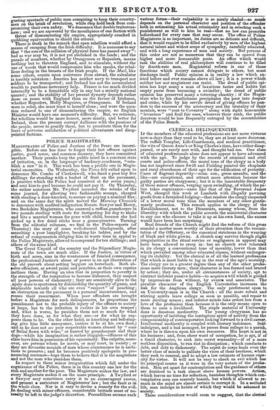POLICE MAGISTRATES.
MAGISTRATES of Police and Justices of the Peace are incorri- gible. Before one has time to forget their last offence against justice, good sense, and common decency, they have committed another. Their pranks keep the public mind in a constant state of irritation, or, in the language of hackney-coachmen, "esta- blish a raw" in it. This week has been a prolific one in Magis- terial enormities. On Wednesday, the Times felt called upon to denounce Mr. Combe of Clerkenwell, who fined a poor boy five shillings for standing with a basket of fruit on the pavement, (a practice which the Police had connived at for seven years,) and sent him to gaol because he could not pay it. On Thursday, the rather notorious Mr. Twyford incurred the rebuke of the same journal, for allowing two fashionable scamps, charged with stealing a door-knocker, to escape on paying a nominal fine ; and on the same day the spirit moved the Morning Chronicle to denounce with merited indignation Messrs. Sawyer and Hercy, two Berkshire Magistrates, who amerced a ruffian gamekeeper in two pounds sterling with costs for instigating his dog to shake and bite a married woman far gone with child, because she had picked up a few dried sticks near a game-preserve. Turning from the editorial columns, we find in the Police-reports (of Thursday) the story of some well-dressed blackguards, after assaulting a poor lamplighter, breaking his ladder, and by the refusal of compensation obliging him to waste time in appeal to the Police Magistrate allowed to compound for ten shillings ; and others of the same
The Great Unpaid of the country and the Stipendiary Magis- trate of the town are much alike. If the Justice, in virtue of birth and acres, sins in the wantonness of fancied consequence, the professional Justice's abuse of power is an apt illustration of the old proverb about setting beggars on horseback. Both ab- solve offenders, or award pains and penalties, as their own caprice inclines them. Having an idea that in proportion to poverty is the strength of the temptation to become dishonest, they suspect all poor persons of dishonesty; they are sensitively alive to the .njury done to sportsmen by diminishing the quantity of game, and implacable towards all who are even "suspect" of poaching ; an obstruction on the pavement is a personal inconvenience, and rouses their resentment. When poor offenders are brought before a Magistrate for such delinquencies, he proportions the punishment not to the probable injury of the offence to society at large, but to the irritation it excites in his own temper ; and, what is worse, he punishes them not so much for what they have done, as for what they are—or for what he sup- poses them to be. On the other hand, as knocking and bell-ring- ing give him little annoyance, (unless it be at his own door,) and as he does not see poor respectable women abused by "sons of Belial flown with wine," or hunted by gamekeepers and their dogs—while his imagination is rather sluggish—offences of this class leave him in possession of his equanimity. The culprits more- over, are persons whom he meets, or may meet, in society ; or they are favourite menials of men whose countenance he is ambi- tious to preserve ; and he becomes positively apologetic in pro- nouncing sentence--begs them to believe that it is the magistrate and not the man who punishes them. In respect to these minor irregularities which fall under the cognizance of the Police, there is in this country one law for the rich and another for the poor. The Magistrate makes the law, and every Magistrate makes it on the same principle. A Twyford or a Sawyer may sometimes carry it to an extravagant excess, and present a caricature of Magistrates' law ; but the fault is in the whole class. Nor is it easy to devise a remedy for the evil. JAI dealing with minor offences considerable latitude must of ne- cessity be left to the judge's discretion. Peccadilloes assume such various forms—their culpabdity is so nicely shaded—so much depends on the personal character and position of the offender both in estimating his actual criminality in selecting such a punishment as will to him be real no law can prescribe
beforehand for every case that may occur. The office of Police Magistrate is so important, its duties are so delicate and difficult, that it would require to be filled exclusively by men of the highest natural talent and widest scope of sympathy, carefully educated, and with a long experience of men and society. But persons of this order are not so numerous that they can be spared from higher and more honourable posts. An office which would task the abilities of real philosophers will continue to be filled by fourth-rate men. Magisterial reform is one of those functions which society cannot delegate to others, but must discharge itself. Public opinion is in reality a law which ex- isted before and ever remains above all law • it is a power which neither law nor magistrate can resist. The dread of public opi- nion has kept many a man of luxurious tastes and habits but empty purse from becoming a swindler; the dread of public opinion has preserved many a tottering chastity : if the Magis- trate who by his churlishness precipitates the poor into despair and crime, while by his servile dread of giving offence he en- ders to the excesses of the aristocracy and the brutality of their menials, were "sent to Coventry" along with right honourable " levanters" and frail fair ones, whatever their rank, the public decorum would be less frequently outraged by the eccentricities of the Police Bench.


































 Previous page
Previous page